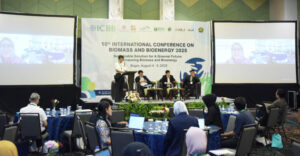Researchers from seven countries gather for biomass talks at IPB University

The 10th International Conference on Bioenergy and Biomass (ICBB), held at the IPB International Convention Centre in Bogor on 4–5 August, was organised by the university’s Surfactant and Bioenergy Research Centre (SBRC) in collaboration with the International Society for Biomass and Bioenergy.
“Our chosen theme reflects Indonesia’s future energy needs: securing our energy supply through sustainable use of biomass and bioenergy,” said Dr Meika Syahbana Rusli, SBRC Chair at IPB University.
One of the conference’s focal points was the development of Sustainable Aviation Fuel (SAF) — seen as both a strategic opportunity and a significant challenge for Indonesia. Dr Meika noted that while the country has made strides in biodiesel production, SAF remains hindered by technical, economic, and logistical obstacles.
“Our roadmap is ambitious: 1% SAF of total fuel by next year, 2.5% by 2030, and 5% by 2035. These targets are not easy to meet,” he acknowledged.
SBRC is also developing technology to convert solid biomass into bio-oil via gasification, an approach that has attracted interest from Airbus Singapore.
With supplies of lipid sources for SAF expected to diminish by 2030, biomass could become the main raw material for production.
Edi Wibowo, Director of Bioenergy at the Ministry of Energy and Mineral Resources, stressed that the government is preparing new regulations to accelerate bioenergy development.
“We want to maximise this potential to strengthen national energy independence and security,” he said.
Prof Ernan Rustiadi, IPB University’s Vice-Rector for Research, Innovation and Agromaritime Development, praised the collaboration between local and international partners.
“Indonesia’s rich biological resources have enormous potential for conversion into bioenergy,” he said.
Arfie Thahar of the Plantation Fund Management Agency highlighted a successful 2024 bioavtur trial, using palm kernel oil blended at 2.4%, on a Garuda Indonesia flight from Jakarta to Solo.

















